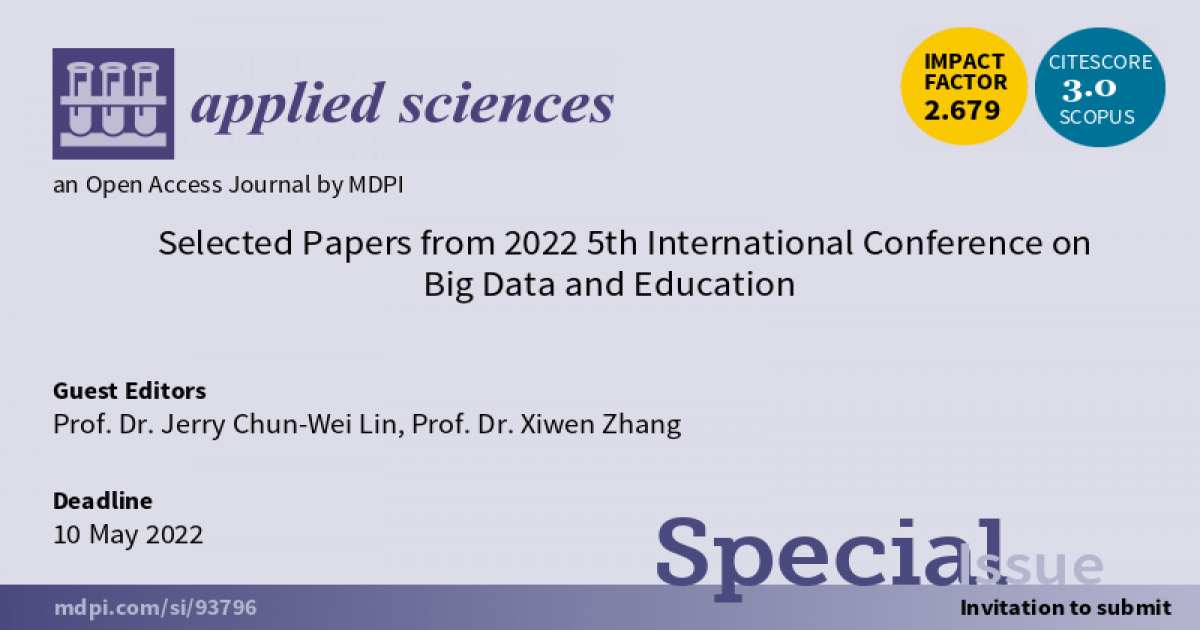Selected Papers from 2022 5th International Conference on Big Data and Education
A special issue of Applied Sciences (ISSN 2076-3417). This special issue belongs to the section "Computing and Artificial Intelligence".
Deadline for manuscript submissions: closed (10 May 2022) | Viewed by 5084

Special Issue Editors
Interests: AI and machine learning; data analytics; optimization; soft computing
Special Issues, Collections and Topics in MDPI journals
Special Issue Information
Dear Colleagues,
Big Data are an emerging paradigm applied to datasets whose size is beyond the ability of commonly used software tools to capture, manage, and process data within a tolerable elapsed time. Such datasets are often from various sources (variety) yet unstructured, such as social media, sensors, scientific applications, surveillance, video and image archives, Internet texts and documents, Internet search indexing, medical records, business transactions, and web logs, and are of large size (volume) with fast data in/out (velocity). More importantly, big data have to be of high value (value) and establish trust in them for business decision making (veracity). Various technologies are being discussed to support the handling of big data, such as massively parallel processing databases, scalable storage systems, cloud computing platforms, and MapReduce. Please join us in discussing the exciting topics above at the ICBDE 2022!
We welcome and encourage the submission of high-quality, original papers, which are not being submitted simultaneously for publication elsewhere. The ICBDE 2022 welcomes the submission of papers concerning any branch of the Big Data and education, and their applications in education and other subjects. The subjects covered by the ICBDE 2022 include Big Data applications, Big Data algorithms, e-learning, online education, digital classrooms, Big Data mining and Analytics, etc., and their applications.
Conference Link:
Prof. Dr. Jerry Chun-Wei Lin
Prof. Dr. Xiwen Zhang
Guest Editors
Manuscript Submission Information
Manuscripts should be submitted online at www.mdpi.com by registering and logging in to this website. Once you are registered, click here to go to the submission form. Manuscripts can be submitted until the deadline. All submissions that pass pre-check are peer-reviewed. Accepted papers will be published continuously in the journal (as soon as accepted) and will be listed together on the special issue website. Research articles, review articles as well as short communications are invited. For planned papers, a title and short abstract (about 250 words) can be sent to the Editorial Office for assessment.
Submitted manuscripts should not have been published previously, nor be under consideration for publication elsewhere (except conference proceedings papers). All manuscripts are thoroughly refereed through a single-blind peer-review process. A guide for authors and other relevant information for submission of manuscripts is available on the Instructions for Authors page. Applied Sciences is an international peer-reviewed open access semimonthly journal published by MDPI.
Please visit the Instructions for Authors page before submitting a manuscript. The Article Processing Charge (APC) for publication in this open access journal is 2400 CHF (Swiss Francs). Submitted papers should be well formatted and use good English. Authors may use MDPI's English editing service prior to publication or during author revisions.
Benefits of Publishing in a Special Issue
- Ease of navigation: Grouping papers by topic helps scholars navigate broad scope journals more efficiently.
- Greater discoverability: Special Issues support the reach and impact of scientific research. Articles in Special Issues are more discoverable and cited more frequently.
- Expansion of research network: Special Issues facilitate connections among authors, fostering scientific collaborations.
- External promotion: Articles in Special Issues are often promoted through the journal's social media, increasing their visibility.
- Reprint: MDPI Books provides the opportunity to republish successful Special Issues in book format, both online and in print.
Further information on MDPI's Special Issue policies can be found here.






